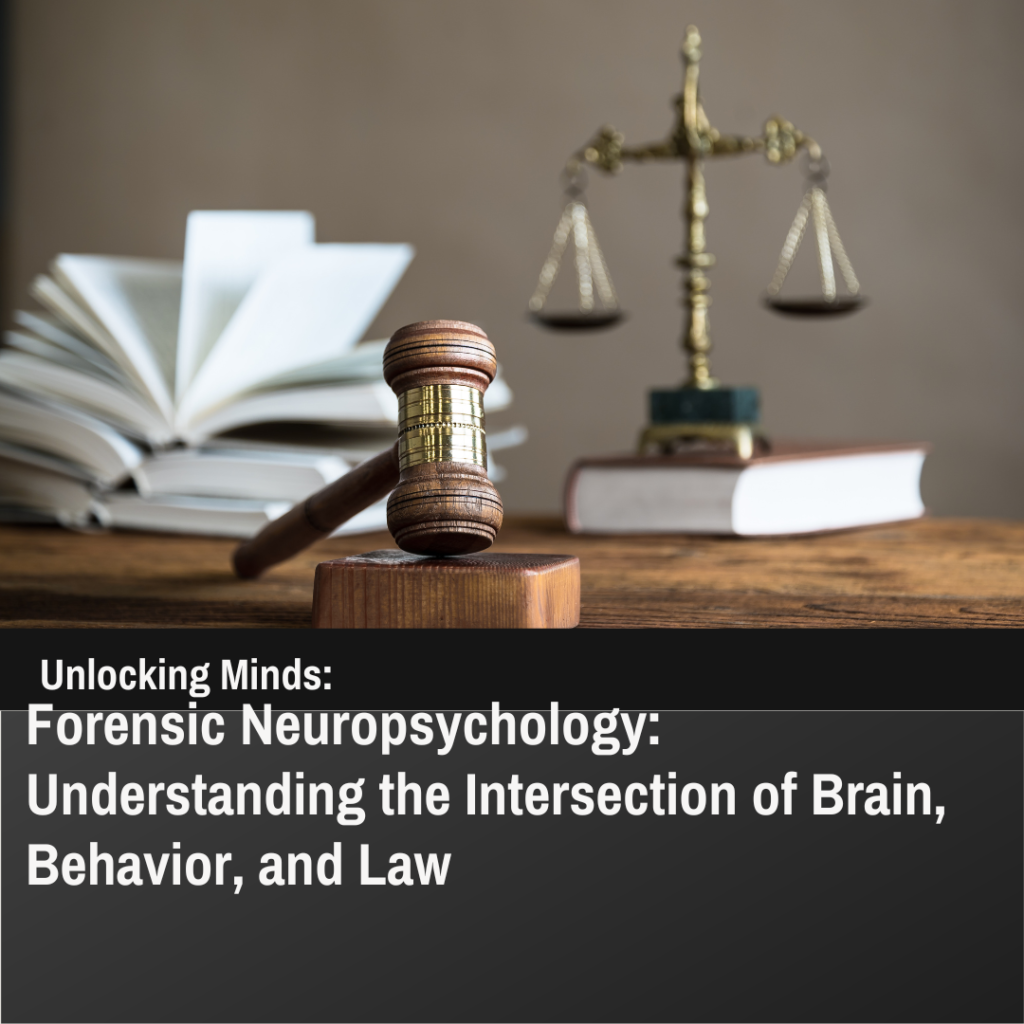Forensic Neuropsychology: Understanding the Intersection of Brain, Behavior, and Law
Introduction
Forensic neuropsychology is a specialized field that combines principles of neuropsychology with the legal system. This field assesses brain-behavior relationships to provide insights into legal cases, contributing valuable information about cognitive and psychological functioning. At ivyleagueassignmenthelp.com we help and guide students to delves into the methods, applications, challenges, and legal and ethical considerations of forensic neuropsychology.
What is Forensic Neuropsychology?
Definition and Importance
Forensic neuropsychology involves the application of neuropsychological principles and techniques to legal matters. It aims to understand the relationship between brain function and behavior in the context of legal issues, providing crucial insights into a person’s cognitive and psychological state.
Historical Development
The field has evolved from traditional neuropsychology, which focuses on assessing brain injuries and disorders, to include a legal perspective. This evolution has been driven by advancements in neuroscience and a growing recognition of the importance of brain-behavior relationships in legal contexts.

Methods and Techniques
Neuropsychological Testing
Neuropsychological tests assess various cognitive functions, including memory, attention, executive function, and language abilities. These tests help identify cognitive deficits and their impact on behavior.
Brain Imaging
Brain imaging techniques, such as MRI, fMRI, and PET scans, provide visual evidence of brain structure and function. These images can reveal abnormalities related to cognitive and behavioral issues relevant to legal cases.
Behavioral Assessment
Behavioral assessments involve observing and evaluating an individual’s behavior in various contexts to understand the practical implications of neuropsychological findings.
Applications in Legal Cases
Competency to Stand Trial
Forensic neuropsychologists assess whether a defendant has the cognitive ability to understand legal proceedings and participate in their defense. This assessment is crucial for ensuring a fair trial.
Criminal Responsibility
Evaluations of criminal responsibility involve determining whether a defendant’s mental state at the time of the crime impacted their ability to distinguish right from wrong or control their actions.
Personal Injury Cases
In personal injury cases, neuropsychological assessments can demonstrate the impact of brain injuries on cognitive and emotional functioning, influencing compensation and care decisions.
Child Custody and Protection
Neuropsychological evaluations in child custody cases can provide insights into a parent’s cognitive and emotional capabilities, helping to determine the best interests of the child.
Challenges in Forensic Neuropsychology
Validity and Reliability
Ensuring the validity and reliability of neuropsychological tests and interpretations is challenging due to individual variability and the complexity of brain-behavior relationships.
Interpretation of Results
Interpreting neuropsychological results in a legal context requires expertise to avoid misrepresentation or overgeneralization of findings.
Ethical Dilemmas
Ethical dilemmas arise when balancing the need for thorough assessments with respect for the individual’s privacy and autonomy. Forensic neuropsychologists must navigate these issues carefully.
Notable Case Studies
Famous Cases
| Case | Details |
|---|---|
| Phineas Gage | His brain injury case highlights the connection between brain damage and personality changes. |
| Andrea Yates | Her case involved neuropsychological assessments to understand her mental state during the crime. |
Lessons Learned
These cases underscore the importance of comprehensive neuropsychological assessments and the need for accurate interpretation in legal contexts.
Legal and Ethical Considerations
Admissibility of Evidence
Courts evaluate the admissibility of neuropsychological evidence based on its relevance, reliability, and potential to assist the trier of fact. This includes considering the methodologies used and the qualifications of the expert witness.
Confidentiality and Privacy
Maintaining confidentiality and privacy is crucial in forensic neuropsychology. Assessors must ensure that sensitive information is protected and disclosed only as necessary for legal proceedings.
Rights of the Assessed
Individuals undergoing neuropsychological assessments have rights to informed consent, privacy, and fair treatment. These rights must be upheld throughout the evaluation process.
Role of Forensic Neuropsychologists
Expert Testimony
Forensic neuropsychologists provide expert testimony in court, explaining the findings of their assessments and their implications for the case. Their testimony can significantly influence legal outcomes.
Assessment and Reporting
Accurate and comprehensive assessments are the foundation of forensic neuropsychology. Detailed reporting of findings helps legal professionals understand the neuropsychological evidence and its relevance to the case.
Collaboration with Legal Professionals
Forensic neuropsychologists work closely with attorneys, judges, and other legal professionals to ensure that their assessments are relevant, understandable, and appropriately applied in legal contexts.
Global Perspectives
Forensic Neuropsychology Worldwide
The application of forensic neuropsychology varies globally, with different countries adopting unique approaches based on legal systems, cultural norms, and available resources.
Comparative Analysis
Comparative analysis of forensic neuropsychology practices worldwide can provide insights into best practices and areas for improvement, enhancing the field’s effectiveness and reliability.
Future Directions
Emerging Research
Ongoing research into brain function and behavior continues to inform forensic neuropsychology, leading to new assessment techniques and better understanding of neuropsychological issues in legal contexts.
Technological Advancements
Technological advancements, such as improved brain imaging techniques and digital assessment tools, offer new possibilities for more accurate and efficient neuropsychological evaluations.
Policy and Legislative Changes
Policy and legislative changes can help standardize forensic neuropsychology practices, ensuring that assessments are conducted ethically and that evidence is used appropriately in legal proceedings.
Forensic Neuropsychology FAQs
What is forensic neuropsychology?
Forensic neuropsychology involves applying neuropsychological principles and techniques to legal matters and assessing brain-behavior relationships to provide insights into legal cases.
How are neuropsychological assessments conducted?
Assessments include neuropsychological testing, brain imaging, and behavioral observations to evaluate cognitive and psychological functioning.
What are the applications of forensic neuropsychology in legal cases?
Applications include assessing competency to stand trial, criminal responsibility, personal injury cases, and child custody evaluations.
What challenges do forensic neuropsychologists face?
Challenges include ensuring the validity and reliability of assessments, interpreting results accurately, and navigating ethical dilemmas.
How do courts evaluate neuropsychological evidence?
Courts consider the relevance, reliability, and potential to assist the trier of fact, as well as the methodologies used and the qualifications of the expert witness.
What role do forensic neuropsychologists play in legal proceedings?
They provide expert testimony, conduct comprehensive assessments, and collaborate with legal professionals to ensure that neuropsychological evidence is accurately and appropriately applied.
